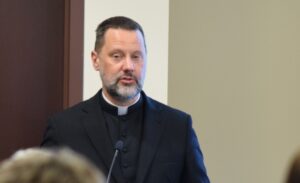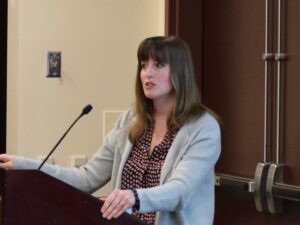Clarity and Love symposium: Annulment is all about the healing

By Paul Thomas Moore
of the Catholic Post
Annulment is an often misunderstood topic even among the Catholic faithful, sometimes derisively referred to as “Catholic divorce.” A symposium held at the Spalding Pastoral Center on Feb. 17 entitled “Clarity and Love: Abuse, Divorce, Annulment,” went a long way toward dispelling misunderstandings.
The session was organized by the Peoria Diocesan Council of Catholic Women (PDCCW) in conjunction with the Office of the Tribunal for the Diocese of Peoria.

Msgr. Jason Gray, judicial vicar and canon lawyer, explained what annulment is and isn’t from the Church’s perspective at the symposium “Clarity and Love: Abuse, Divorce, Annulment” held Feb. 17 at the Spalding Pastoral Center in Peoria. The Catholic Post/ Paul Thomas Moore
The morning featured talks from Msgr. Jason Gray, judicial vicar for the Diocese of Peoria, and Emma Boucher, who has a doctorate in psychology and is the owner of Genesis Counseling in Morton and Normal.
As well, Pat DeCapp of St. Mary of Lourdes in Germantown Hills spoke of her experience as a volunteer “notary auditor,” answering preliminary questions and helping people prepare their annulment applications should they want to proceed.
Women from Prairie Fire Ministries of the Diocese of Peoria were available for individual prayer with attendees.
Bond did not form
In his talk, Msgr. Gray said “annulment doesn’t dissolve a marriage, but declares . . . this marriage was null from the beginning.” He quickly added, “This does not mean the children are illegitimate . . . . everyone assumed it [the marriage] was valid at the time. What we’re saying is the bond did not form.”
Any pre-existing condition or attitude that impedes one or both parties from fully and freely committing to the four “goods” of marriage (partnership, permanence, fidelity and fruitfulness) could be grounds for an annulment.
Factors that may have prevented the marriage bond from validly forming might include alcoholism, or undiagnosed mental illness. Msgr. Gray explained that any pre-existing condition or attitude that impedes one or both parties from fully and freely committing to the four “goods” of marriage (partnership, permanence, fidelity and fruitfulness) could be grounds for an annulment.
He clarified that the annulment process is about establishing whether at the very beginning, and for whatever reason, one or both parties was unwilling — or somehow unable — to hold up his or her end of the marriage bargain.
Emma Boucher of Genesis Counseling made the critical point that a challenging marriage is one thing, but that the presence or threat of abuse is something else again, and is never acceptable. In such cases, self-protective preparation is recommended: “If somebody crosses a boundary . . . . I know who I’m going to call; I know what I’m going to do.”

Emma Boucher of Genesis Counseling discussed the importance of setting boundaries and having a contingency plan in the presence or threat of abuse in a marriage. “If somebody crosses a boundary . . . . I know who I’m going to call; I know what I’m going to do.” The Catholic Post/ Paul Thomas Moore
Bert Fandel, event organizer and PDCCW Respect Life Chair, added that sometimes “loving means leaving.”
Sooner rather than later
If someone is considering petitioning for an annulment after a civil divorce is granted, Msgr. Gray advised that they should “file sooner rather than later,” so as not to forget the details. He reiterated that the annulment process focuses on the couple at the time of the marriage. Memories fade, and witnesses who may be very helpful to the process may pass away.
In helping people to prepare their annulment applications, notary auditor Pat DeCapp is struck by “how many of the people have gone through it, and said ‘I have never felt better about myself than I do now.’”
So, how does the healing happen? “That closet [where] you put all that anger and frustration and revenge . . . you pull out and look at, and when you look at it . . . you get a chance to heal.”
DeCapp concluded, “There has been nobody that I have worked with, in probably 15 years, that hasn’t been thrilled that they went through the process.”
There has been nobody that I have worked with, in probably 15 years, that hasn’t been thrilled that they went through the process. — Pat DeCapp, volunteer notary auditor
A normal expected time frame for an annulment could be 6 to 12 months, though there are always exceptions. Sr. Anna Flanigan, a judge with the Office of the Tribunal for the Diocese of Peoria, said notary auditors are available for consultation across the diocese.
Anyone looking for more information on annulment can call the tribunal at 309-671-1550, and they will be referred to someone in their geographic area. Confidentiality is assured.





